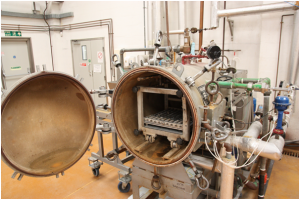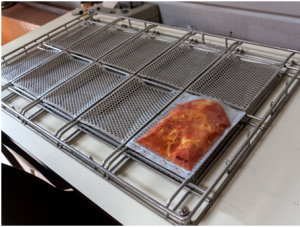 FoodStream Engineer Chris Bourne was recently awarded a George Alexander Foundation fellowship through the International Specialised Skills Institute for a round-the-world study tour to investigate new developments in thermal processing.
FoodStream Engineer Chris Bourne was recently awarded a George Alexander Foundation fellowship through the International Specialised Skills Institute for a round-the-world study tour to investigate new developments in thermal processing.
Chris visited leading equipment manufacturers – JBT Foodtech (USA) & Steriflow (France), training courses in food preservation (Britt & Associates, Canada) & Quality Optimisation (Campden BRI, UK). Also he had an opportunity to attend the Thermal Processing International Conference (UK).
The Challenge
Traditionally, canned goods have benefits in shelf stability but this often comes at the cost of organoleptic and nutritional properties. The long shelf life also opens the market to international processors. To remain competitive, the Australian industry needs to continue to develop innovative products with high quality and also improve production efficiency. Existing processes can be optimised using advanced modelling and statistical techniques. Modern equipment also allows new products to be developed.
 Prototype Shaka Retort, UK
Prototype Shaka Retort, UK
There is a growing demand in Australia for long shelf life products which give convenient ready-to-eat meals with no loss of flavour, texture and nutrition and are preservative free.
New approaches to thermal processing provide an opportunity for developing new products in this growing market area.
Optimising existing products
Optimising quality of thermally processed goods involves reducing over-processing. Statistical approaches identify critical process and ingredient factors which affect variance in the final product. To create a clear picture of variation between and within batches, the Taguchi Method may be used to identify critical factors in heating. Monte Carlo Modelling can also be a powerful tool to model variation using known parameters. With these two combined, variance can be reduced and a reduced heating process applied.
Real-time finite difference modelling control systems are now available which calculate core temperature on-the-fly and pave the way for more complex temperature profiles than the traditional ‘plateau’. They can also catch and correct for unexpected deviations and changes to initial conditions.
Importantly, the investment in process optimisation modelling is low and with no ongoing costs. Real-time finite difference modelling has ongoing licensing fees but in most situations, process improvement will cover this.
Better modelling of thermal processing not only gives better product quality through shorter processing but also cost savings through energy efficiency and plant efficiency as more batches can be processed in a given time.
New product opportunities
As well as analysing existing processes, by taking full advantage of the latest equipment there are exciting opportunities presented to the Australian industry for new and innovative products.
Thermally processed foods with higher quality can replace chilled foods and so remove all the shelf life and wastage issues with chilled foods but also remove refrigeration costs.
 Trial pasta product in Shaka support frame, France
Trial pasta product in Shaka support frame, France
Cheaper and more powerful automation can make old concepts more viable, and new processing technologies open doors for products which were previously couldn’t be made.
For example, products such as higher quality seafood and Thai curries are easier to make, where the integrity of fish, vegetable and meat pieces is important. Favourable formulation changes are also possible such as salt reduction without compromising flavour.
Another area of opportunity where nutrition is important and safety paramount is military rations. The same applies to products for camping and hiking.
Aggressive agitation ‘Shaka’ retorts can have dramatic increases in product quality for products with suitable viscosity eg thick sauces. Because of the quick cycle time and small batch sizes, a high level of automation is often needed to make these systems viable. Some products new to the market such as fish soup and cheese sauce have the shelf stability of a canned product but quality closer to a pasteurised, chilled product.
Other technologies such as High Pressure Processing or Pulsed Electric Field can, when used as an additional step, reduce the need for severe thermal processes, improving quality.
Packing advancements in recent years also provide thinner profiles, allowing for more minimally processed goods.
For more information about these possibilities, use the enquiries form.
A full report will be available from the International Specialised Skills Institute in coming months.
The International Specialised Skills Institute is an independent, national organisation that works with Australian governments, industry and education institutions to enable individuals to gain enhanced skills and experience in traditional trades, professions and leading-edge technologies – http://www.issinstitute.org.au/